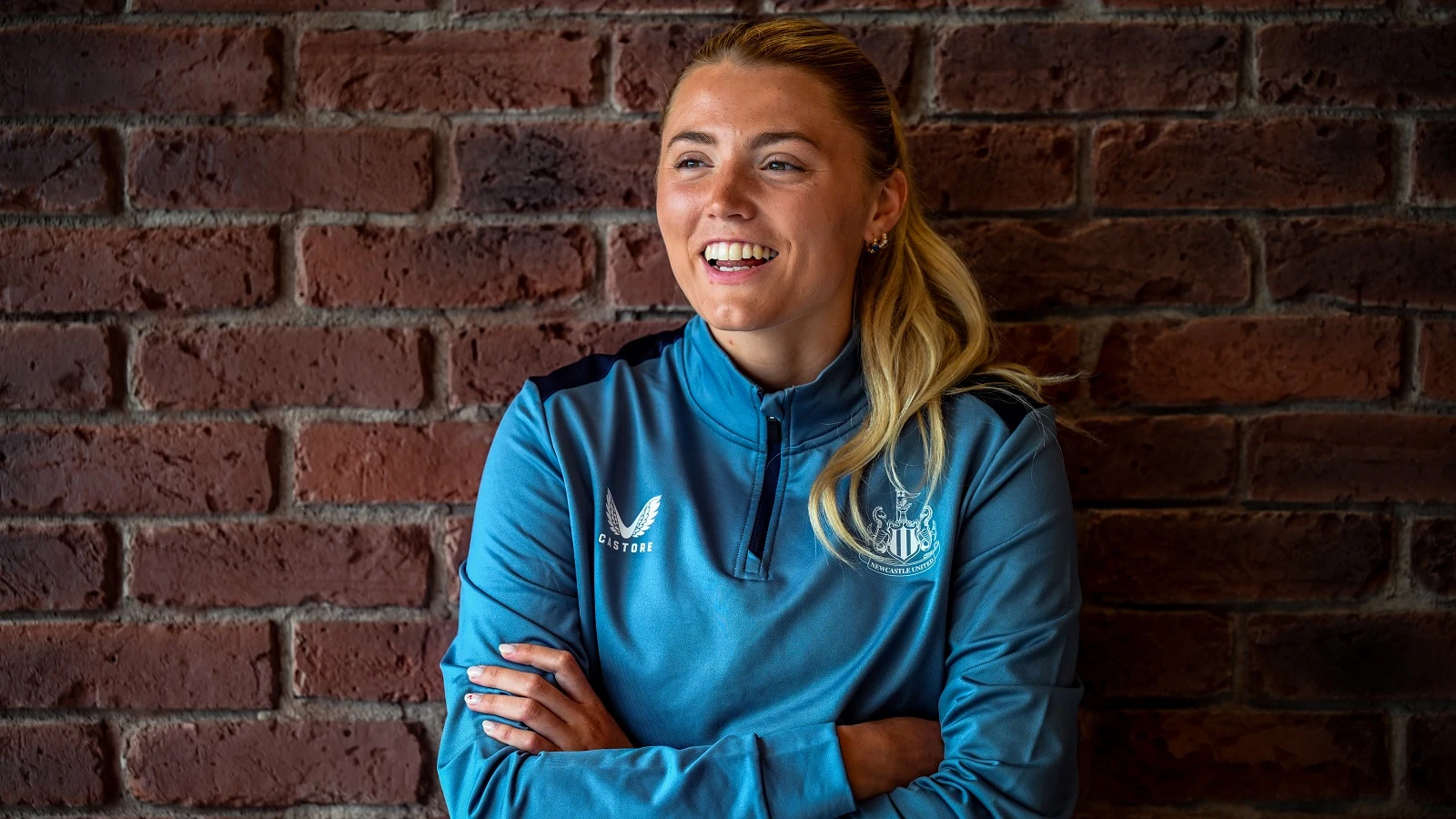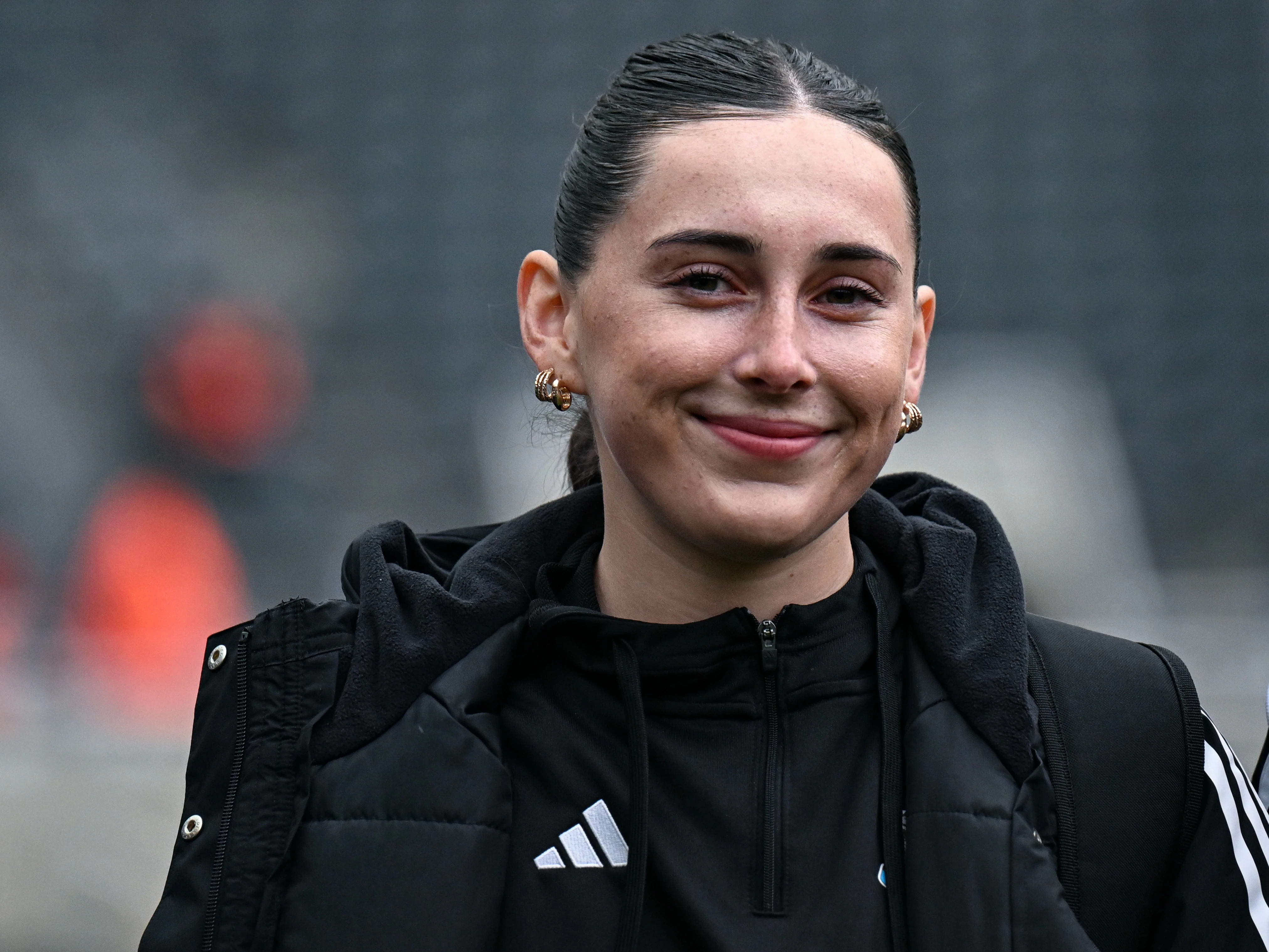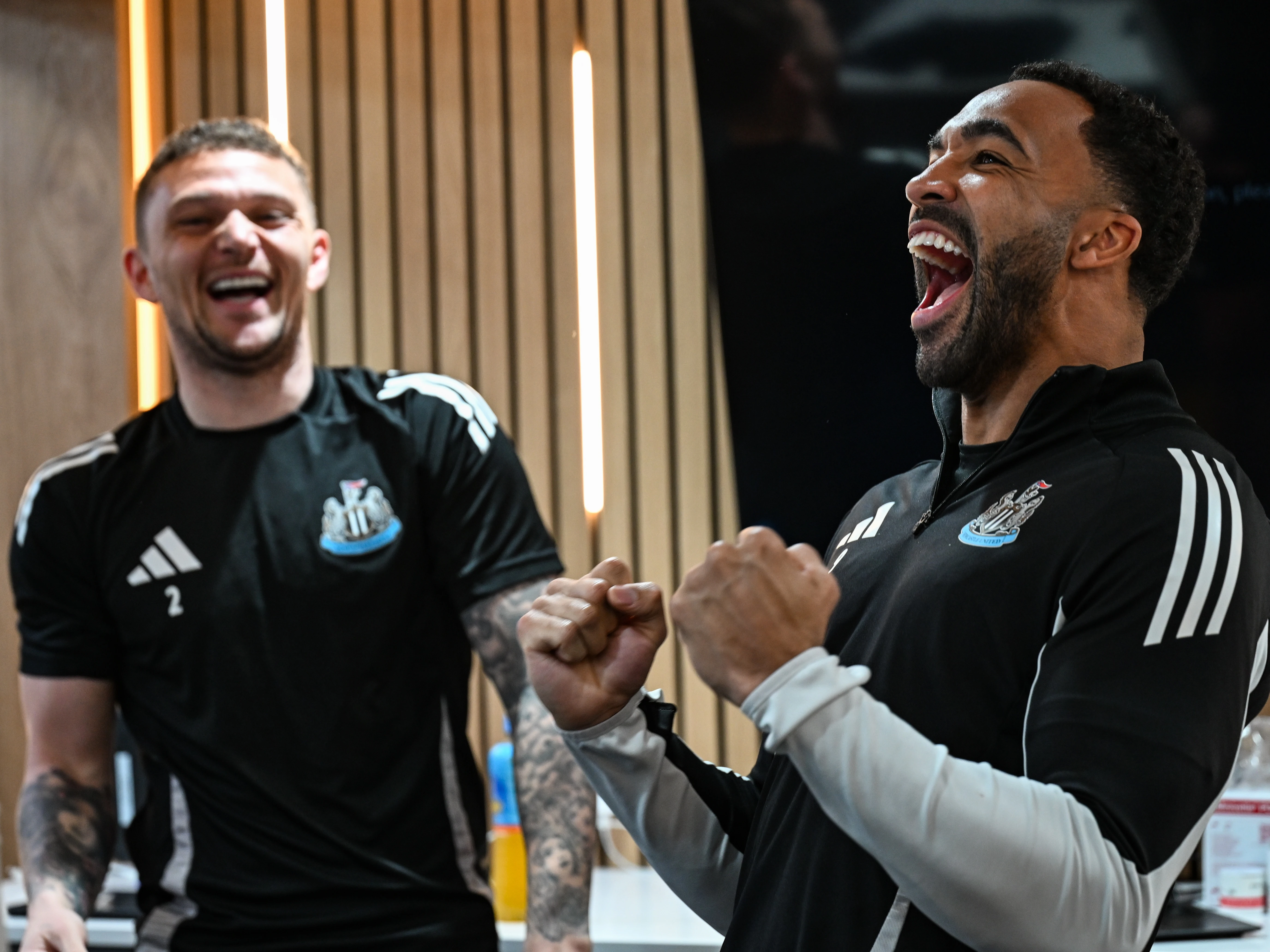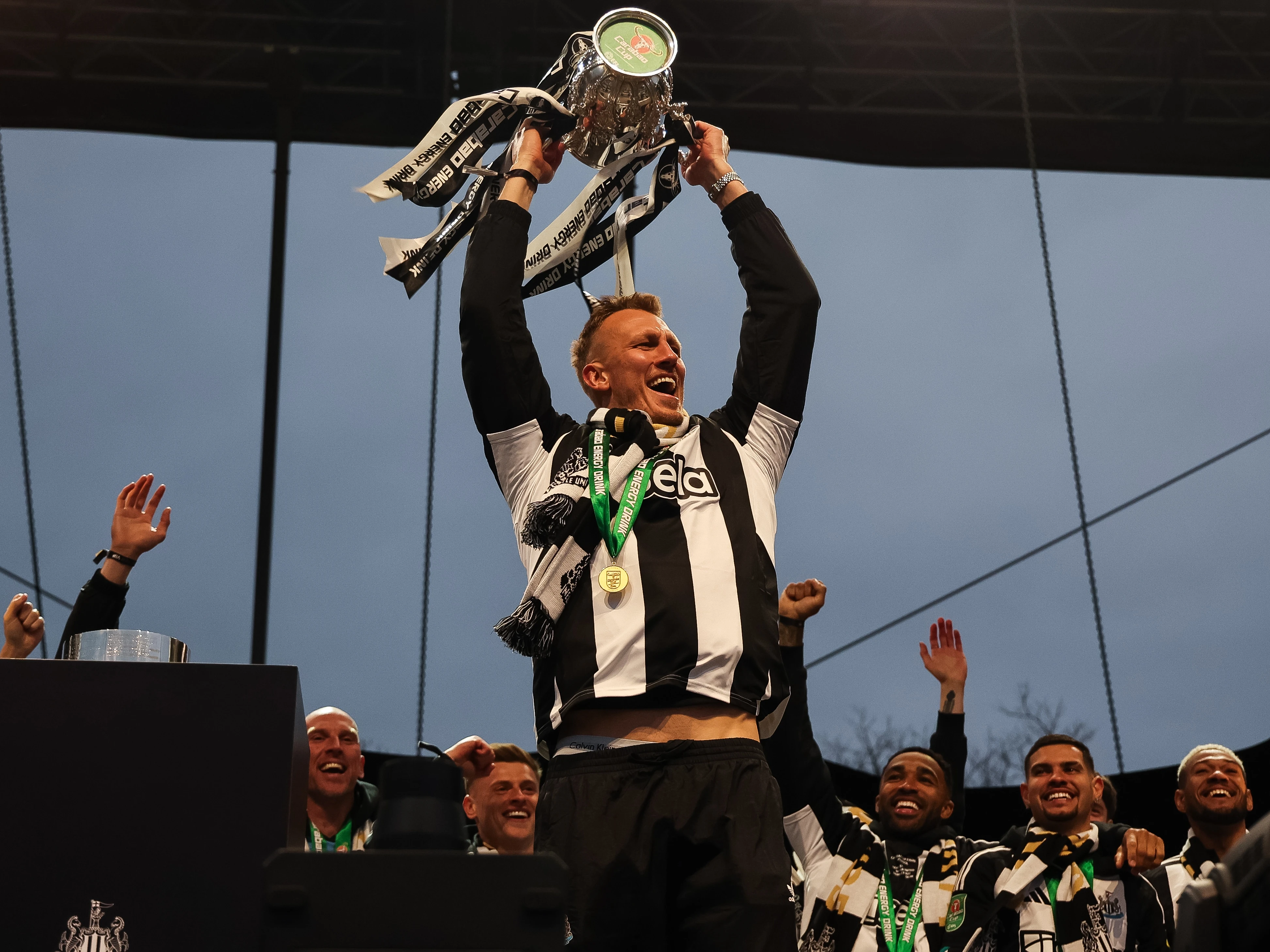It is a bright morning but just a glimmer of light is peeking around the floor-to-ceiling blinds in the players' lounge. It neatly frames the small round seating booth in the corner where Erin Nelson finds a sliver of humour in a painful memory from last autumn. She is recounting her own misfortune at having to spend a second milestone moment on a hospital ward, undergoing surgery on a fractured foot. "I had the operation on my birthday - my 21st birthday," she sighs. "When I was at Durham, I broke my collarbone - it snapped in half and came through my skin. That was on my 18th birthday. That was fun. My 30th is the next big one. I'm a bit worried. I don't know what's going to happen!"
Her tone is jovial and it remains so over two-and-a-half hours of conversation at Newcastle United's training centre in Benton. But there is a more serious point to the winger's story, which we are rattling through at a pace consistent with her natural ebullience. Before surgery, a niggle in her right foot had become a sharp pain and it was suggested to her that it must have been because she had been running on concrete. "But it's not. It's absolutely not," she says. "It was because of what we're about to talk about."
This interview came about after a social media post during Eating Disorder Awareness Week in March. In it, Nelson outlined her experiences after being diagnosed with the syndrome of relative energy deficiency in sports (RED-S), formerly known as female athlete triad. According to a consensus statement published by the International Olympic Committee in 2014, the condition refers to 'impaired physiological functioning caused by relative energy deficiency and includes, but is not limited to, impairments of metabolic rate, menstrual function, bone health, immunity, protein synthesis and cardiovascular health... The aetiological factor of this syndrome is low energy availability (LEA)'. Its impact can extend to, or affect, issues around disordered eating, body image, self-esteem and mental health.
There is a lot to unpack but by doing so publicly, she wants to help other young girls and athletes who find themselves suffering as she has. "I want people to understand that they're not alone, and there are people around who will speak about it. It's not a topic that's spoken about a lot. It's something I think is big.
"You have fans who are young girls, so for me, and for them, it's about learning that this is what this is, you can combat it this way, and please don't feel like you're alone – because you're not."
-
Nelson hails from Whitley Bay and - as of next month - is a professional footballer for Newcastle United Women. One of five siblings, sport was in the family. She was just six when Ben Dawson, then a football development officer at Newcastle United Foundation, suggested she attend trials at the club's academy. Girls had to be seven in order to train and eight to play then; Nelson would pretend to be older just to remain involved. After spells with North Shields and Bedlington she was asked to join Durham Women, where she progressed through the ranks. At 16, she was training with the Wildcats' first team.
Before leaving secondary school, she began to notice others' uneasy relationships with food. "A lot of the girls didn't really eat anyway," she explains. "A lot of them didn't really want to eat. I remember one of my friends being like, 'I'm just going to eat celery for lunch, because it burns more calories eating it than it does having it in your body, and it fills you up'."
Nelson was slim anyway, a size eight, but others in what she describes as a "very looks-orientated" peer group were slimmer. The distinction between the athlete's physique she needed to play football and the "Instagrammable body" sought by others her age was difficult for her to make. There was pressure, unspoken or otherwise, to look attractive and social media - ever-present in the lives of teenagers, even in the mid-2010s - didn't help. She felt a quiet need to look a particular way. "At the time, I'd feel like I was too muscley or too skinny," she adds. "There was no in-between – I would either feel fat, or too skinny. I never felt right."
Running was a passion too - she was of national standard - but eating before races started to feel like a chore. She would have three cubes of raw jelly and a coffee, unable to stomach much more because of the nerves and pressure she felt. "I'd want to burn all the calories," she says. "I would basically burn off the calories I was eating, so I wasn't helping myself gain any muscle." Ignoring the fact she was often the superior athlete, she would instead fixate on what she felt was a disparity between her body and those of her competitors. "I was also going to competitions where you'd wear skimpy little shorts, a little crop top. People would be walking around and they were so skinny, so slim. Subconsciously, I'd compare myself to them too. I used to be like, 'oh my God - this girl looks so good, and I look like this', on the start line."
She scratched at the surface of these thoughts with her older sister Meg, also a runner, but only later would she learn more about some of the feelings she had experienced. Nelson has just finished her degree in Sport and Exercise Science at Northumbria University. Her dissertation centred on a comparison of body image between aesthetic sports, team sports and endurance sports in relation to female athlete triad.
"It's finding that balance that's the hard part - you want to look a certain way, but you want to be able to perform to the best of your ability. So where do you lie? You're going to have to give something up, and it's normally the looking a certain way, and you just have to deal with that.
"But then that comes with (a detrimental effect on) confidence. Some people aren't confident in their body looking so muscular. When I've done research, 'looking like a man' was a quote that came up. Some people don't want to look so muscular because they don't think that that's perceived as attractive (in relation to) actual social normality, or social media. But it's amazing for your sport."
By the time she made it to the fringes of the reserve side at Durham, she would be getting pushed off the ball, acutely aware of her teammates' more powerful frames. She had given up running by then and gradually began to gain weight after enrolling at Tyne Metropolitan College, where she also played football at a good standard. "But when it came to a point when I didn't like the way I looked again, I'd then go back into the cycle of wanting to lose weight."
-
Nelson had never heard of female athlete triad or RED-S. "I had loads of symptoms that showed me that I probably wasn't eating enough," she reflects. "But I was naïve to think that it wasn't that. I was just like, 'I'm ill - I've got something wrong with me'. I was constantly like that. I used to go home and literally sleep all the time. I was so tired, absolutely knackered - I wasn't eating, but I was training three times a day sometimes.
"At that time, it was my normal. I knew it wasn't healthy. It was my normal but I knew that my normal wasn't normal - 'my sister's not doing this, my mum's not doing this, my brother's not doing this, so maybe it isn't normal'."
Two aspects of the condition were most apparent. Her lack of energy was exacerbated by disordered eating. "I never restricted myself in terms of not eating at all. I wasn't starving myself - I just wouldn't eat as much as I would before, or I would burn it off.
"And then, because I liked the way I looked because of the disordered eating, I then flipped onto the side of an eating disorder - 'ooh, I like this, I'm going to keep doing this' - and then began to not eat as much, because I liked the way I looked and I wanted to sustain it."
That meant she would say she wasn’t hungry when "there wasn't any part of me that wasn't hungry," she recalls. "I remember lying in bed really hungry, but thinking, 'this is good - I've got another 12 hours where you're asleep and you're not eating. So don't go and eat, Erin, because you've got all of that time where you're not eating'. I'd think, 'that's good' - I'd be in the mindset of thinking that was good. My stomach would be rumbling and I'd think, 'oh my God - but that's good'."
From the age of 14 to 17, she didn't get her period. There had been occasional spells of fluctuation, where "I'd either have a period and it'd be like a day, which is not normal, or not have a period at all, or the other extent where six months down the line, I'd have the heaviest period I'd ever had in my entire life," she adds. "There was no in-between, no monthly period, no monthly function, and that's really severe for if you want babies in the future because it can cause you to become infertile."
It reached a point where she became constantly dizzy. She went to the doctor, who requested a breakdown of her training schedule and food intake. "I was just eating nearly nothing - mostly cereal, to be honest." She can recount the doctor's words with clarity as he diagnosed her. "'Your menstrual cycle is non-existent and you have disordered eating – you don't eat a lot, and even if you don't think you have disordered eating you're still in that category, because you're not eating a lot for what you do. You burn so many calories you're in a calorie deficit every single minute of your day - there's no part of you that eats enough for how much you do'.
"And then he said that this can cause osteoporosis, which is the other side of it. And that's why I think I broke my foot."
She would return each month to be weighed, which helped, and over two years became more adept at managing her weight. By the age of 17 she was doing well, coming to view food as fuel for fulfilling her sporting capabilities, and made her senior bow for Durham in an FA Cup tie at Bristol City in 2020. Working towards a degree at the height of the Covid-19 pandemic brought stress and with that her weight and eating habits fluctuated, but by the time she rejoined Newcastle United in 2021, she felt fit and excited about what lay ahead.
-
We break for a cup of tea. The tape has been on for over 90 minutes already but thoughts are still surfacing at speed. Last season could have been a big one for Nelson. She had worked tirelessly through the summer and was in close to peak condition, but there were doubts in her head, she explains. Am I fit enough? Am I where I want to be technically? It was indicative of her restless mind. "You just have all your emotions going around in your head at every given moment," she nods. "You have no rest."
Instead, 2022/23 was when "the whole world just fell down on top of me." In pre-season, she felt a slight twinge in her foot. She climbed Scafell Pike in pain but played in a friendly the next day. A scan showed a stress fracture which, after six weeks in protective footwear, still hadn't healed. By October things had improved but after two training sessions, she felt a ping as she planted her foot. Tears flowed; she knew it was broken and a belated MRI confirmed it. The break, she feels, was intrinsically linked to RED-S and the symptoms of female athlete triad.
At the same time, events in her personal life began to affect her too. The stress, combined with the impact of her injury, had a spiralling effect. Weight dropped off her after the surgery and she stopped eating as she had been. Her period stopped. She felt herself relapsing.
"I felt so lost. I felt like I was just not alive. That sounds so weird, but I felt like I just didn't have a purpose to live," she says. It never got as dark as those words suggest, she insists, and she knew she could get through it - but just didn't know where to start. "I was an absolute mess emotionally. It was the worst mental (state) I'd ever been in. I think that was what relapsed me, in terms of not eating. I was so stressed, so sad. I was so anxious and apprehensive of life. I didn't know where I was going to be. Was it even going to heal? There was a chance it wouldn't heal, and I'd have to have a bone graft. Then there were all these questions. Am I going to come back and be better than I was? No. Am I going to be as good as I was? No."
January and February of this year marked both a physical and mental nadir. When she went out for a friend's birthday, she used shoelaces to hold up her jeans. "I was the skinniest I'd ever been in my whole life. I went from 64 kilograms to 52 kilograms in less than a month. I was so ill - crazy ill," she says quietly. "I felt like everything had caved in on me."
There was an evident and substantial emotional weight to bear. There was guilt at the upset her family felt seeing her like that. She was touched but shaken by the care of friends - some of whom she'd stopped talking to in the preceding months - who noticed her decline. One sat with her as they ordered a Domino's one night, realising she just needed to eat. Nelson was training with the Magpies again, but feeling uneasy and anxious in an environment she would usually thrive in. After one session, teammate Sharna Wilkinson stopped her in the car park. "In a football kit, you can see everything - you can't hide. I explained the whole scenario. She was like, 'number one, you need help. Number two, you need to eat. And number three, if you're going to carry on the way you are, I'm going to cry my eyes out'.
"I was like, 'I know. But I don't know what to do. I don't know where to start. I'm at a point now where I know I'm ill, but there's nothing helping me because my brain won't stop'."
Help was sought. She began to see a therapist, once a week initially. She worked on breathing techniques and coping mechanisms to combat the stress and anxiety that had led to her relapse. They developed ways of managing her eating better and her family made sure she had ready meals in the freezer, food readily at hand. She began to go out for meals, the thinking being that in a social setting she would feel compelled to have something. She put on four kilograms in a month.
Gradually, her therapy sessions became sparser as she continued to gain the weight she needed. The distraction of a mammoth dissertation, on a topic so close to home, helped her tune into what she was going through. By the spring she felt better; well enough to make it to the brink of a competitive return for the Magpies. Her period returned a few months ago too, an event she almost felt like celebrating with her partner. "It's the little wins, isn't it?" she laughs.
-
Nelson made her competitive comeback in March, coming off the bench against Durham Cestria, and went on to finish the season strongly. She scored twice in the 6-0 win at Bradford City and provided an assist in the last-day 2-0 victory at Barnsley that sealed the FA Women's National League Division One North title. By the end of the campaign she felt she was getting closer to how she used to be; the rest will come in time, she hopes, but that injury-free finish quelled some of the self-doubt that had stalked her.
The summer break was a welcome one. "I gave myself just three weeks to just sit and eat - literally just sit and eat, because I was so slim. I was still only 58 (kilograms) around that time, so I'd only really put on about six kilograms up until the end of the season." Now she is a healthier 64 kilograms. "Now I'm in such a good place, I refuse to get back there. I just refuse for that to happen."
She has a sense now that things are aligning for her, personally and professionally. "I feel so content in my life," she smiles. "Before, I felt out of place in my own brain, if that makes sense. I was trying to find solutions to fix that, failing miserably, stressing, and then not eating. I got into a routine of still not eating and then I'd just look at food and think, 'nah, that's disgusting - no way'. When I relapsed, it wasn't because I made myself not eat - it was just I was so stressed there was nothing about me that wanted to eat."
There will be others in the women's game who have fought similar battles but may not have a support network as strong as Nelson's. She admits that football dressing rooms aren't always brimming with potential confidantes. It is one of the reasons she wanted to do this interview, and in doing so perhaps start a productive discussion about eating disorders. "I'm not shy about it. It's a big topic that I want people to be able to speak about openly," she says. "It's such a big thing, and I know it's such a big thing, because I know many people that I grew up with playing football who have had one."
At the suggestion of her therapist, Nelson has spent plenty of time on holiday recently. She explored Sorrento with her mum and enjoyed the sun in Crete and Rhodes. It was easier to relax in the knowledge that on her return, she would become a professional footballer. The mention of last month's contract offer elicits a big grin. "It's crazy. But it makes you want to work harder for it. You have to keep being here, you want to see where it goes. You want to hold on for dear life."
There is much to look forward to. Earlier this morning, her step mum gave her a card to congratulate her on getting a contract and achieving a 2:1, which she will graduate with later in July. When the news came through she jumped out of bed in elation and surprise, really, "because of the year I've had." Celebrating the small wins felt good. There is even more reason to cherish the bigger ones.
"I'm feeling really good – I feel the best I've been in a while," she beams. "I'm really excited. It's a new year, a new season and a new start."




